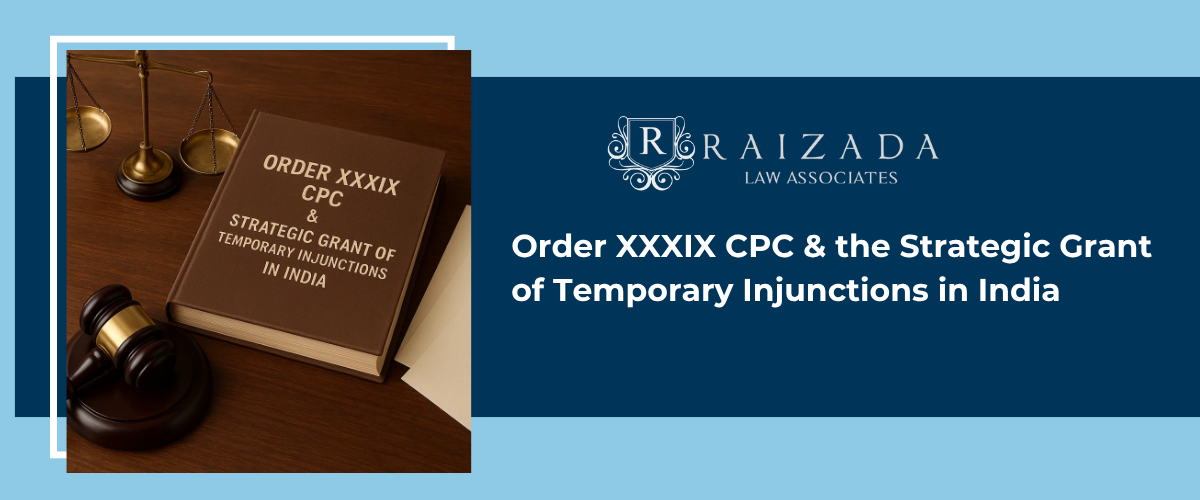In civil litigation in India, interim relief serves as a pivotal mechanism to prevent the miscarriage of justice before final adjudication. Among the foremost tools of such interim relief is the temporary injunction, governed primarily by Order XXXIX of the Code of Civil Procedure, 1908 (CPC). Temporary injunctions are judicial orders that prohibit a party from undertaking certain actions that may prejudice the rights of the other party during the pendency of a suit.
From a seasoned Civil Lawyer in Delhi’s perspective, understanding the contours of Order XXXIX is crucial for the effective prosecution or defence of civil claims, particularly where immediate protection of property or legal rights is warranted.
Statutory Framework under Order XXXIX CPC
Order XXXIX CPC contains two primary rules pertaining to temporary injunctions:
- Rule 1: Enables courts to grant temporary injunctions when:
- There is a prima facie case,
- The balance of convenience lies in favour of the applicant, and
- There is a likelihood of irreparable injury if the injunction is not granted.
- There is a prima facie case,
- Rule 2: Empowers courts to restrain a party from breaching an obligation existing in the form of a contract or other legal duties.
These provisions are rooted in the equitable doctrine that equity aids the vigilant, not those who slumber on their rights. Thus, interim relief ensures that justice is not rendered nugatory by delays inherent in the trial process.
Judicial Interpretation and Precedents
The Supreme Court of India has consistently underlined that temporary injunctions must not be granted mechanically. In the landmark case of Dalpat Kumar v. Prahlad Singh, (1992) 1 SCC 719[1], the Apex Court clarified that courts must be satisfied that the threefold test (prima facie case, balance of convenience, and irreparable harm) is met cumulatively.
In another pivotal ruling—Gujarat Bottling Co. Ltd. v. Coca Cola Co., (1995) 5 SCC 545—the Court emphasized that injunctions are a preventive remedy and must not result in undue hardship to the defendant, reinforcing the balancing role of judicial discretion.
Procedural Safeguards and Principles
While deciding an application under Order XXXIX, courts are bound to:
- Issue a notice to the opposite party, unless delay would defeat the very purpose of the injunction (as per Rule 3).
- Record reasons for granting ex parte orders, to uphold the principles of natural justice.
- Require the applicant to furnish an undertaking for damages if the injunction is found to have been wrongly granted.
This approach is in line with the increasing emphasis on transparency and accountability in interlocutory proceedings. A Civil Lawyer in Delhi must ensure that clients seeking such relief are fully aware of the burden they carry in seeking equitable remedies.
Practical Considerations for Litigants
The strategic value of a temporary injunction lies in its potential to:
- Prevent the alienation, destruction, or misuse of disputed property.
- Restrain parties from violating non-compete clauses or misusing confidential information in contractual disputes.
- Curb unauthorised construction or encroachments in property matters, especially rampant in urban jurisdictions like Delhi NCR.
Importantly, while the relief is equitable, its consequences are binding. Misuse of injunctions—such as obtaining them on false premises or suppressing material facts—may attract punitive costs or dismissal of the suit altogether.
Ex Parte Injunctions and Urgency
Under Rule 3 of Order XXXIX, courts may grant ex parte injunctions in exceptional cases, where delay may defeat the ends of justice. However, the applicant must:
- Clearly disclose all material facts,
- Demonstrate extreme urgency, and
- File an affidavit justifying non-disclosure to the opposite party.
In Morgan Stanley Mutual Fund v. Kartick Das, (1994) 4 SCC 225[3], the Apex Court cautioned against indiscriminate grant of ex parte injunctions and laid down strict conditions to curb abuse of this discretionary power.
Revocation, Variation, or Appeal
Temporary injunctions are not absolute. The defendant may file for:
- Vacation or modification of the injunction under Order XXXIX Rule 4,
- An appeal under Order XLIII Rule 1(r) CPC before the District Court or High Court, depending on the jurisdiction,
- Or seek a review if material facts were suppressed.
This layered remedy structure ensures that interim orders remain subject to judicial scrutiny and accountability.
Temporary Injunctions in Commercial Disputes
With the advent of the Commercial Courts Act, 2015, Indian courts have witnessed a transformation in the manner interim relief is granted. Temporary injunctions in high-stake commercial disputes, particularly in intellectual property, shareholder disputes, and infrastructure contracts, are now subject to stringent scrutiny.
The Delhi High Court, being a preferred forum for commercial litigation, has streamlined injunction procedures with time-bound frameworks and heightened disclosure requirements. A Civil Lawyer in Delhi practising before the commercial bench must be equipped with rapid drafting strategies, complete documentation, and precise legal reasoning to secure or resist such relief effectively.
Misuse and Judicial Caution
While injunctions serve an essential protective function, courts have repeatedly cautioned against their misuse as a tool for harassment or delay. Frivolous applications are often viewed as attempts to secure unjustified leverage in litigation.
To deter this, courts increasingly impose:
- Heavy costs on vexatious litigants,
- Time-bound injunctions subject to compliance conditions,
- And in some cases, criminal contempt proceedings for wilful violation of injunction orders.
Conclusion
In conclusion, the grant of a temporary injunction under Order XXXIX CPC is a complex interplay of law, equity, urgency, and factual nuance. Courts are not merely to preserve rights but to prevent injustice and economic waste.
A skilled Civil Lawyer in Delhi plays a vital role in marshalling facts, anticipating judicial concerns, and presenting a compelling case to secure or oppose interim relief. Whether it involves protecting property rights, enforcing contractual obligations, or restraining unlawful conduct, strategic litigation under Order XXXIX remains a cornerstone of civil justice.




